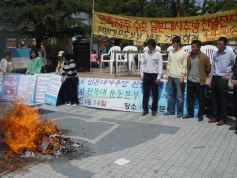JBNU Focus
제목
College students rise against pro Japanese collaborationism
Admin | 2005-05-03 | 조회 4562
본문 내용

By Lee Ah-rum, Reporter
After a Japanese local council designated "Takeshima (Dokdo) Day" last March, anti-Japanese sentiment has surged inside Koreans. Since then the Japanese Ministry of Education authorized some problematic history textbooks that not only claim Dokdo as Japanese territory, but also justify its invasion of Asian countries in the 19th century. This matter over the distorted history textbook has also fueled anti-Japanese sentiment among Koreans. Meanwhile, an incredible incident happened: Hahn Sung-joe, who used to be a professor at Korea University, wrote an article praising the 35-year Japanese colonial rule on the Korean peninsula. How could a Korean professor, not a Japanese, write such a stupid story? Hahn's claim incited anger among Korean citizens. Also, it caused Korean college students to realize that it is most urgent and important to remove pro-Japanese collaborationists during the 1910-1945 period from Korean society.
Last March 30, students from seven universities, including Chonbuk, Korea, Seoul, and Ewha, had a meeting in front of the Japanese Embassy in Seoul, in which they formed a "college student movement body for protection of national independence, expulsion of Japanese ambassador to Korea, and eradication of pro-Japanese collaborators." Several days later, on April 4, students from 13 universities located in the Seoul area held a ceremony in front of the Japanese Embassy in Seoul to set out the student movement body. That day, they designated May 9 and 19 as days to censure Japan for its approval of controversial history textbooks. They have since launched a ten million signature campaign to deprive pro-Japanese activists, conducting a boycott of products made in Japan.
On April 14, Chonbuk University's General Students Association held a press conference on the university's Notification Street (알림의 거리). In the conference, they announced the inauguration of the Jeonbuk center for the student movement to root out pro-Japanese collaborationists. Also, they stated that they would actively persuade Geonjians to participate in a signature campaign to eradicate pro-Japanese collaborators and to boycott Japanese merchandise.
However, on the contrary to some university students' passionate anti-Japanese activities, the majority of college students were revealed to think that though a person worked for Japanese imperialism, we should give him or her credit for his or her achievements, according to a recent survey conducted by the Internet university news website "unews" (http//:www.unews.co.kr).
When reporters from The Chonbuk Herald asked what the eradication of pro-Japanese collaborators means, Professor Jeong Cheol-hee from the social science department, said: "The removal of pro-Japanese collaborationism is to establish a correct history so that Koreans should never do such extreme pro-Japanese activities again as they did during the colonial period." Professor Jeong asked college students to study Korean modern history and understand it correctly.
"It is positively necessary to root out pro-Japanese collaborationists in order to block the revival of Japanese militarism and secure peace in East Asia," stressed Park Sang-jun, a staff member from a movement organization for eradication of pro-Japanese collaborators. "We should realize that pro-Japanese activities are not just a matter of the past. That is a matter of the present. This awareness is the first step to root out pro-Japanese collaborators."
The Chonbuk Herald(May 2, 2005 Vol. 180)
Count : 92
272731 KB
Leave your feedback






















